| Reviews & Columns |
|
Reviews DVD TV on DVD Blu-ray 4K UHD International DVDs In Theaters Reviews by Studio Video Games Features Collector Series DVDs Easter Egg Database Interviews DVD Talk Radio Feature Articles Columns Anime Talk DVD Savant Horror DVDs The M.O.D. Squad Art House HD Talk Silent DVD
|
DVD Talk Forum |
|
|
| Resources |
|
DVD Price Search Customer Service #'s RCE Info Links |
|
Columns
|
|
|
Sapphire and Steele: The Complete Series
"All irregularities will be handled by the forces controlling each dimension. Transuranic, heavy elements may not be used where there is life. Medium atomic weights are available: Gold, Lead, Copper, Jet, Diamond, Radium, Sapphire, Silver and Steel...Sapphire and Steel have been assigned."
Remarkable English sci-fi series. Shout! Factory has released Sapphire and Steel: The Complete Series, a six-disc, 34-episode (each "assignment" is comprised of multiple episodes) collection of the cult U.K. sci-fi series that ran sporadically on ITV from 1979 to 1982. Starring David McCallum and Joanna Lumley (both cool and elegant and off-putting), Sapphire and Steel is an intelligent, mysterious, utterly fascinating outing featuring Lumley and McCallum as "inter-dimensional agents" who roam the Time corridor, looking for breaks in the walls...and for the "creatures," ancient and not-yet-born, who seek to disrupt the balance on the other side. Sapphire and Steel was originally released on DVD here in the States by A&E back in 2004; that collection has some nice extras including audio commentaries by series creator/writer, Peter J. Hammond. Unfortunately, those (and any new) extras are missing here--a big drawback that might encourage newcomers interested in this title to seek out copies of the '04 collection. The original materials utilized for the fullscreen transfers here are problematic...but not fatal.
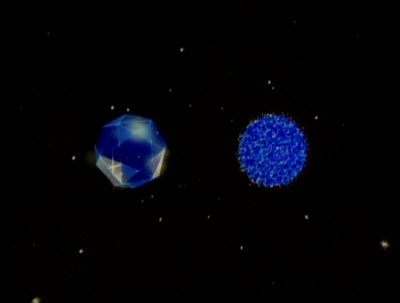
Episode synopsis: "A family's life in an 18th-century house is disturbed by a break in time, which causes young Rob and Helen's parents to disappear. As Rob tries to solve the mystery, the enigmatic Sapphire and Steel arrive to fix the disruption. Could a simple nursery rhyme be the cause of it all?"

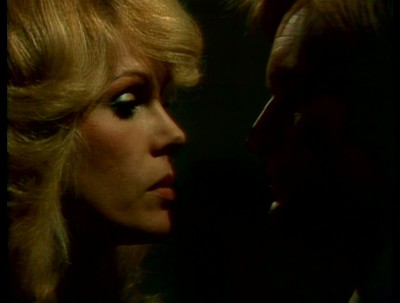
Considering the hyper-combative state of establishing sci-fi fanboy cred today, I doubt I would even qualify as a noob with most straight-up sci-fi ballers. I grew up watching repeats of the original Star Trek until their stories and co-stars were burned into my brain...but I wouldn't know what button to push for a photon torpedo or to engage warp drive if my life depended on it. I also enjoyed Space: 1999 when I was a kid...but I'd skip it if Pal's The War of the Worlds was on. I saw all the Star Wars and Star Trek movies when they first came out...but I had more fun going to Outland and Alien...and even The Swarm (did you hear that? That was the sound of sci-fi fans clicking off this review en masse). I had my Cylon Warrior action figure out whenever I watched the original Battlestar Galactica...but I got bored quick with Star Trek The Next Generation, while The X-Files paled next to Kolchak: The Night Stalker for me. And when I think of British science fiction, I think of The Avengers before Doctor Who. So I'm no expert on the genre in any way, just an ordinary viewer with (probably) weird, arbitrary tastes (I'll watch Sturges' Marooned in a heartbeat over Kubrick's 2001: A Space Odyssey any day).
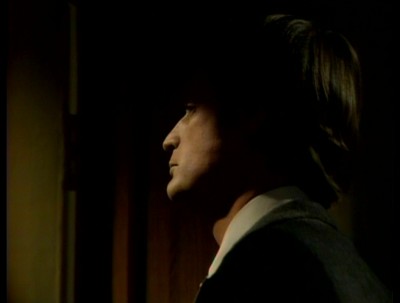
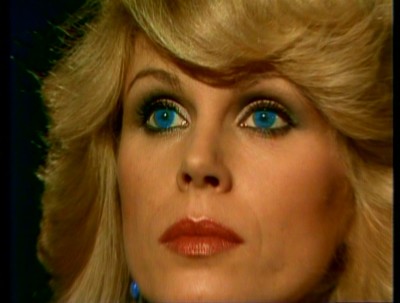
With that rather haphazard sci-fi pedigree, it's no surprise, then, that I had never heard of Sapphire and Steel before this disc showed up. Researching it, I discovered that it has a small but extremely loyal cult following, and that while it's relatively obscure among even semi-serious purveyors of the genre, it's very well regarded among those who really understand a thing or two about sci-fi television. Shot on a miniscule budget (typical for British TV at the time), Sapphire and Steel had to rely on atmosphere and solid writing to get across its attractively vague, enigmatic tale of two inter-dimensional "operators" whose purpose is to protect nothing less than the integrity of Time itself. No snazzy special effects here (lots of video chroma key along with good, old-fashioned dark shadows and scary sound effects on the cramped studio mock-ups), no million dollar-an-episode budgets, as was the case for contemporary American sci-fi series, Battlestar Galactica, and no A-list supporting players turning up as "Special Guest Star Creature" of the week. Just good writing, imaginative direction, and two lead performances well-tuned to this series' thoroughly odd, thoroughly captivating vision. From what I can gather, Sapphire and Steel wasn't a particularly big hit with the critics or British public when it premiered, and an industry strike its first year followed by its production company losing its TV franchise, essentially doomed the series to less-than-optimal visibility with U.K. viewers, until its final "series" (season) was burned off in 1982 without any publicity (plans to continue on were scrapped by Lumley and McCallum who wished, since all signs pointed to a "failed" show, to move on). According to what I've read, it wasn't even repeated on British television.
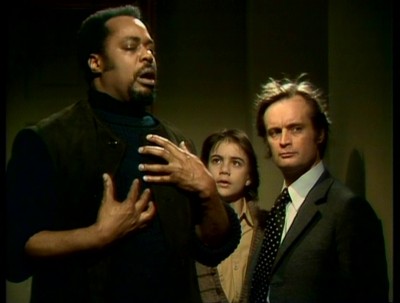
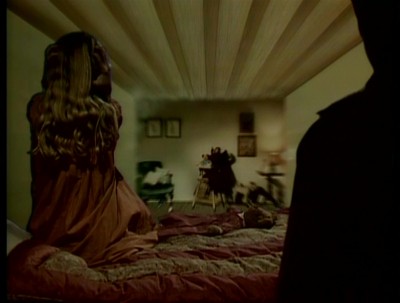
Too bad...because it's one of the most intriguing, entertaining sci-fi series I've ever seen. To be frank, when I first heard that Outer Limits-like opening narration and saw those ghostly chroma keyed opening credits rolling, looking like something from the Dumont Network circa 1953, I was dreading plowing through the 14+ hours here (the animation credits didn't exactly help, either, executed on about the level of a typical 70s Hanna-Barbera toon). However, in first few minutes of the opening episode, Assignment I (no official titles were ever assigned by creator/writer Hammond--just another quirky, unusual detail from this oddball series), it had me hooked: a young boy, doing his homework, suddenly notices that all the clocks in the house have stopped...and so have the voices of his parents, who were reading a nursery rhyme to his younger sister. Shot on a tight little studio mock-up of an old English farmhouse, the deep, impenetrable shadows (loss of image detail is also due to the poor nature of the original video elements and their original transfers), and the oppressive use of the clicking clocks and subsequent silence on the soundtrack, creates a mood of tense menace and apprehension that seems as much Hammer as Heinlein. Once the young boy determines that his parents really have disappeared seemingly into thin air, operators Sapphire and Steel arrive with equal tenuous reality, and the story kicks into gear, creating an increasingly jumpy, apprehensive mood over its six chapters/episodes until the frightening, violent conclusion.
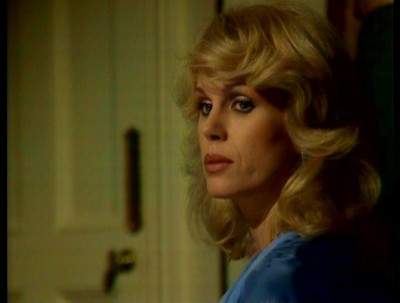
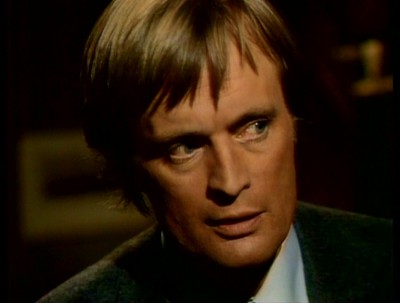
What I enjoyed most about this episode and all the others in Sapphire and Steel is how lost the viewer is to what, exactly, is going on, and who, exactly, the participants are here. You have to pay attention...and you're still not quite sure what the rules are as the episodes progress. In the opener, Sapphire and Steel give to the young kids as close to an explanation of what they do as you're going to get in the whole series: Time is like a corridor that has weak spots, like worn fabric. And at those weak spots, Time itself, or the "creatures" that roam the corridor--"creatures," usually the dead but not always, that are past representations of themselves, similar to ghosts--try to either occupy current time, or take away present occupants. And the "trigger" for these attempts is usually some kind of siren song of something old: a nursery rhyme, or an old song, or an old house--anything with "old, old echoes" that beckons Time or the "creatures" lost in Time's corridor. It's a fascinating representation of that most elusive intangible, Time, but what's rather remarkable about Sapphire and Steel is that that definition isn't finite; Hammond constantly comes up with absorbing variations on it in subsequent episodes, constantly keeping the viewers off-balance, and challenging them to try and keep up.
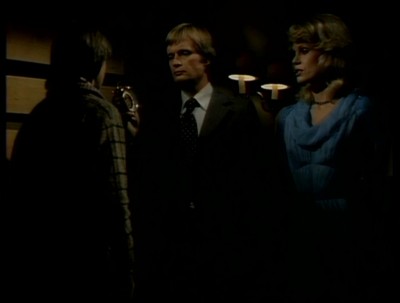
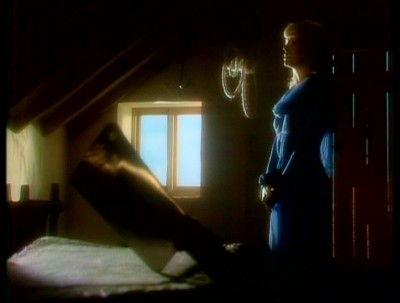
Along with that refusal to put Sapphire and Steel's "world," if you will, into sharper, more concrete context, the lead characters as well remain wonderfully unpredictable and elusive. In one episode, Steel admits they're "extraterrestrial," but one is never entirely sure if that means they're "alien," or advanced humans that no longer consider themselves human, or elemental forces taking human form, or...something else entirely. Clearly they have superhuman powers, and they live for hundreds if not thousands of years. Sapphire can, by touch, "spot analyze" objects or humans and determine where they've been or what an object is made of; she can also "take back time," in a sort of re-wind capacity that can move time backwards and provide an approximation of events and figures that already occurred and appeared. Steel, like Sapphire, can communicate telepathically; he posses super-human strength along with the ability to freeze himself down to zero degrees in order to "touch" the ghostly apparitions/approximations of the dead that roam the corridor and that break through Time to menace others. Perhaps the most unique aspect to this "crime-Time"-solving duo, if you will, is their almost complete disregard for the humans they're sworn to protect. Their overriding mission is to protect Time's integrity, no matter what...but if they can save the humans in peril, they must. However, if it's unavoidable, they're sacrifice them, even the innocent, to save the multitude (or even if it's easier to just let those unfortunate humans die).
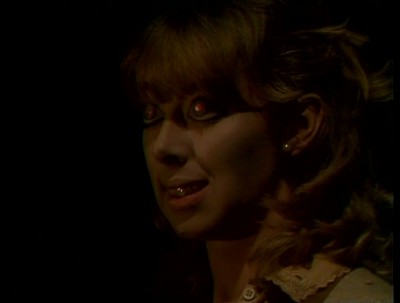
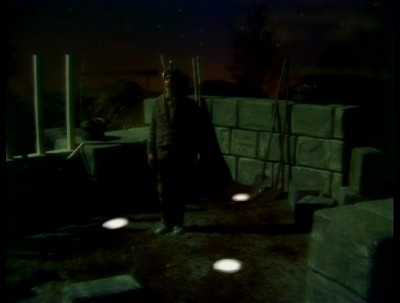
Far from being molded in the traditional "hero" elements, Sapphire and Steel, elegantly cool and distant to their human contacts, have a decidedly patronizing attitude towards them. Steel is just an outright bastard, strong-arming uncooperative suspects, sneering with derision at scared victims, or yelling at little kids to get them to talk, while Sapphire frequently shows a smug condescension for humans, until she either gets bored or she needs to be more ingratiating to get better results than Steel's bullying. We never discover, though, who or what they really are, or indeed the precise nature of their assignment. Are they from the present, past or future? Are they spies, or independents (that question comes up in the final episode)? Who do they "work" for...if indeed it's "work" and not something more like "duty?" Who's their "boss," if you will, because apparently, there's a "higher authority" that has it in for them, as we discover in the final installment? We just don't know...and that leaves plenty of room for the viewer to begin to truly wonder what's up with the whole shebang...and that's a welcome surprise. Cheap but excellent special effects pop up here and in the other episodes, many of which are of the most mundane origin; in this episode, spots of light travel along the floor and wall, becoming quite creepy as we begin to look for them in other shots. The production values drawback of using cheap video actually helps here in Sapphire and Steel, as the creative versatility of the medium is used to fine effect, such as the constant looping of the copper arriving at the door, repeating faster and faster for a surreal effect. Imaginative direction, as well, features rather dynamic frames (for television), with an ever-shifting perspective that keeps the storyline, its context, the characters, and even the dimension of time, in constant flux--which keeps us thoroughly off-balance.
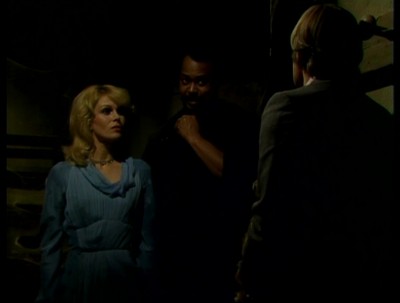
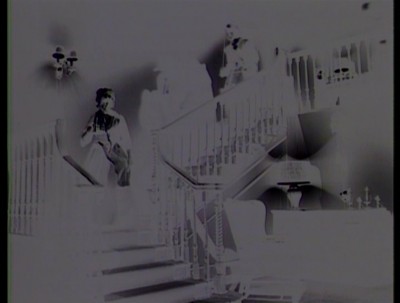
ASSIGNMENT II
Episode synopsis: "A paranormal expert's study of an abandoned train station is interrupted by the arrival of Sapphire and Steel. As the two inter-dimensional agents investigate a dark force that lives on the bitterness of the dead, the assignment challenges them to consider the value of one human life versus the security of reality itself."
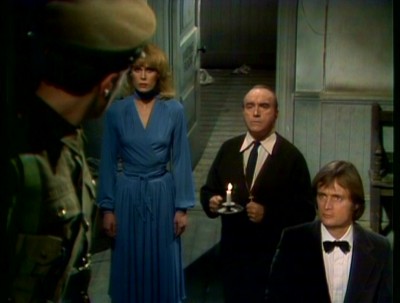
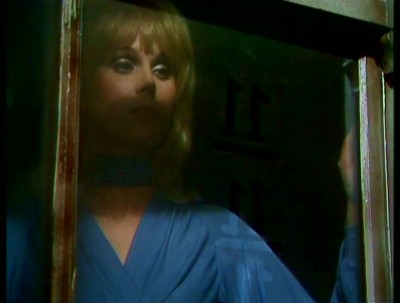
A remarkable episode because it leads SPOILERS ALERT! straight to the deliberate, unapologetic sacrifice of an innocent--a nasty reality of Sapphire's and Steel's priority to keep Time inviolate, one that brings the viewer up sharp. Steel's contempt for sad-sack amateur spiritual investigator George Tully (Gerald James) is open and unrelenting, with Steel dismissively calling him a "crank" and mocking his spirituality. It will take Sapphire's more nuanced approach, as usual, to get Tully's help, and they need him, because both are in real danger (Sapphire is taken over by a malevolent force, while Steel almost dies in a parachute jump and then on barbed wire in "No Man's Land"). However, after several episodes where we really being to feel sorry for scared, pathetic Tully (he sadly admits to only having a cat in his life), it's a shocking ending to see Steel lie to him as he sends poor Tully to his death (check out Tully's little goodbye wave). The script makes no bones about Steel and Sapphire not honoring the resentment the dead soldier feels for dying too young--another unusual twist in the story. The spooky abandoned train depot set is utilized quite well, along with an evocative score (that Third Man twang is offset nicely by all the creepy whistled WWI songs), and excellent effects (the sudden flashing of costume changes over dimensional lines is perfectly realized; the grunginess of the video effects looks almost contemporary).

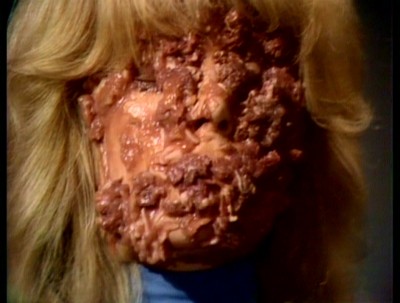
ASSIGNMENT III
Episode synopsis: "Sapphire and Steel encounter a pair of time travelers from the distant future. The travelers are involved in an experiment with repercussions for the future of the human race--but are they the conductors of this experiment, or the subjects?"
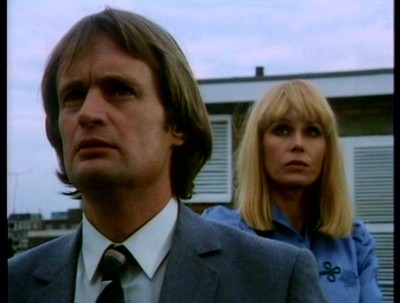
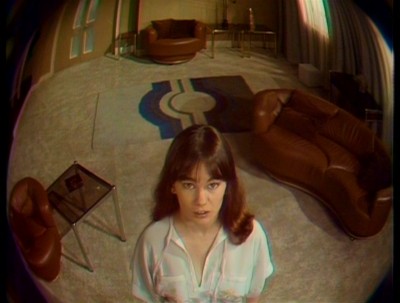
This is the only "assignment" in the collection that I had just the slightest bit of trouble with, not because of the ideas in the eventful, suspenseful story line (which are cool), but because of the execution. Here is the only time that Sapphire and Steel's el cheapo budget works against itself: when you have to actually show one of the Time corridor "creatures" as an actual creature, it's a fine line between believable and silly, and the difference is always dollars (or in this case, pounds). The notion of the two sealed, invisible space pods on the London apartment building is good, with well-designed location shooting of Steel and Sapphire trying to determine the crafts' dimensions a fun sequence. The growing baby Frankenstein (he even wears the uniform: a sports coat!), educated Superman-style via audio/visual stimuli, is also nice, especially when he starts going around, turning everything he touches into dust. And the anti-cloning, cyborg animal-machine hybrid bent on revenge against human kind, while not too terribly well presented here, is at least whacky enough to be interesting. Only when we're forced to see this creature do the giggles set in (first it's a floating fetus, and then is it appeals to be 15 pounds of skinned veal, pulled fast along by a string--seeing McCallum chuck a raw joint into a wall conduit to feed it is hilarious).
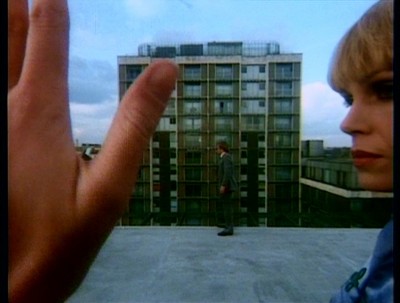
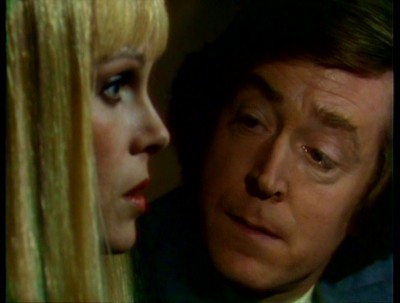
As for our operatives, we learn Sapphire can't always "take back time," while Steel shows his complete lack of concern with wiping out an entire apartment building and its inhabitants if it makes it easier to deal with the unknown invaders on the roof ("Humans love a good sacrifice," he offers flatly). Once they ascertain the nature of the "invaders'" plan, his contempt for them is just as pronounced; learning that they're incompetent scientists from Earth's future, he advises them to kill themselves, like their colleagues did, to save Time's integrity. The episode's big plus is the first appearance of Silver, played to perfection by David Collings (Albert Finney's Scrooge). A rather jaunty and flip tech, Silver is sent down to help out operatives with his specialized skills...with the responsibilities of the mission left to them ("I'm a technician, not an explorer!" he exclaims when faced with the prospect of equal, and dangerous, duty). His flirtatious behavior with Sapphire raises Steel's blood, giving the duo an intriguing new element to their relationship. His character is a much-needed counterpoint to Sapphire and Steel's relentless "otherness," with Collings amusing, light approach most welcome here.
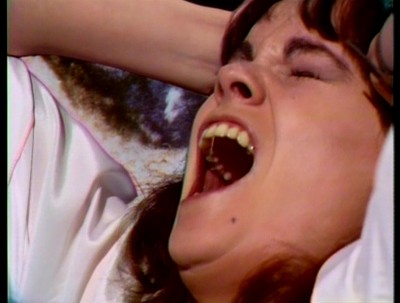
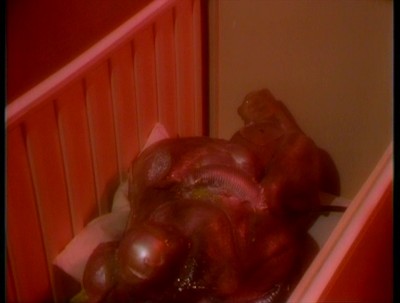
ASSIGNMENT IV
Episode synopsis: "The agents' investigation of a mysterious apartment building leads to a confrontation with a faceless man who possesses the power to trap people in photographs."

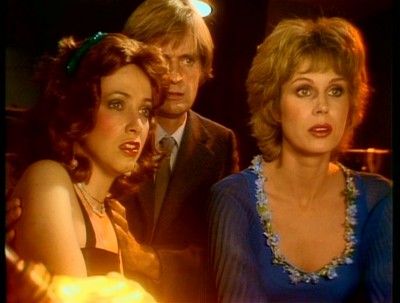
A shorter entry in the series, this "assignment" is the most visually claustrophobic of all the episodes, with a cramped, murky, dingy feel to it that contrasts nicely with the expansive (and creepy) nature of the Time creature: one who has been in every photo ever taken, either with his back turned...or unseen behind walls or other objects. Sapphire fails twice this time around to "take back time," giving the character faults that further removes these operatives from standard "superhero" status (they almost "die" here, too, trapped in an old photo that the creature plans on burning). There's a good performance by Alyson Spiro as Liz, a sad tenant of the building where the creature resides, a girl who knows she's going nowhere (the operatives offer little if any comfort to her: they have a job to do). The special effect of the "no face" man is quite effective, and there"s a tour de force effects sequence on the staircase, employing double images, positive and negative, looped editing, and an increasingly hysterical audio track depicting Sapphire's unsuccessful effort to drag the creature's time back for analysis (whoever the sound editor was on this series is a genius). A solid entry in the series.
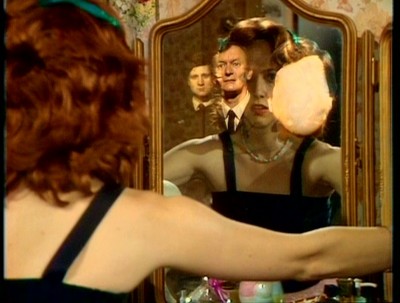
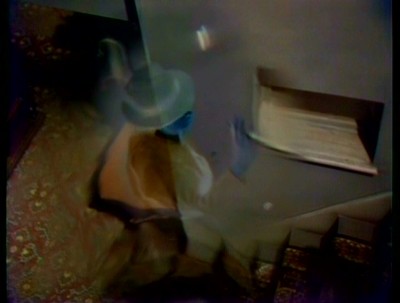
ASSIGNMENT V
Episode synopsis: "An industrialist's 1930s-themed party creates an anomaly where the past merges with the present. Sapphire and Steel's attempt to correct this dilemma is further complicated when the party guests begin to be murdered one by one."
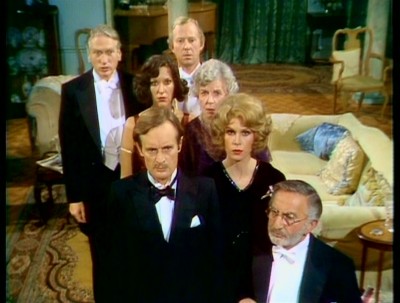
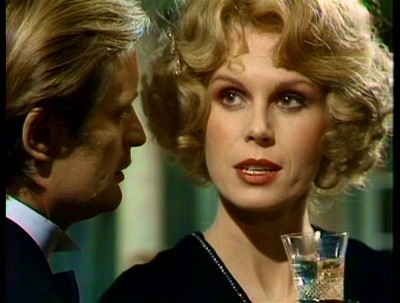
The only episode not written by Hammond (scripters Don Houghton and Anthony Read take over here), this "assignment" is a fun amalgamation of reverse time travel and Agatha Christie, with Sapphire and Steel just as much amused bystanders as active investigators in this witty outing. The main mystery involving too-far-advanced DNA research and mutant bacteria is quite good, as is Sapphire and Steel's duty, yet again, to make sure a death--this time a murder, more accurately--occurs to ensure the proper realignment of Time. The direction is quite good, with the constantly shifting context of the various characters' coming in and out of the present into the past making this seemingly ordinary "English country house murder mystery" doubly impenetrable. It's also fun to see Sapphire and Steel begin to succumb to the games-playing (Sapphire not only kisses Steel but also tries to blow him away via pistol), while the seemingly dotty old ladies (Nan Munro and Patience Collier) trade hilariously crusty one-liners. Different in feel from the other series' entries thanks to the new writers, this lighter touch is a nice contrast to the heavier outings...particularly the final one.

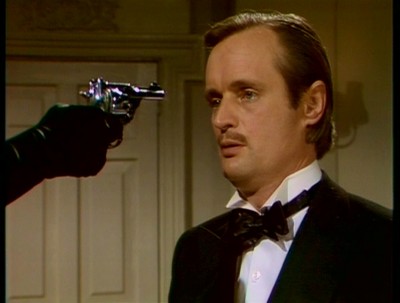
ASSIGNMENT VI
Episode synopsis: "An old service station where time has seemingly stopped is the site of Sapphire and steel's latest assignment--but the two operatives are unsure what that assignment entails. The service station's two inhabitants, who claim to be from the year 1948, might be their only clue to solving this mystery."
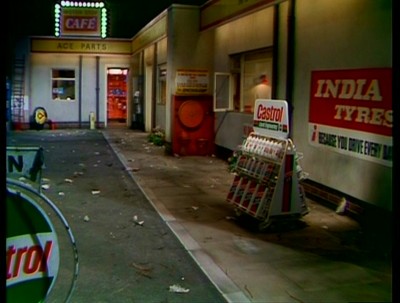
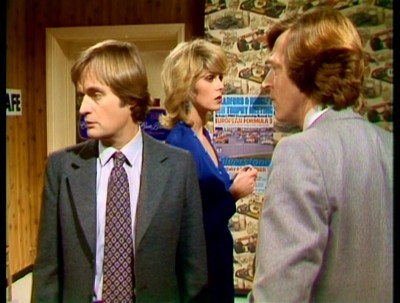
The best "assignment" is also the final one in Sapphire and Steel. Inexplicably assigned to a Time breakage at a modern gas station/cafe, Steel and Sapphire are surprised to see Silver already present--an anomaly in procedure they should have noted more carefully. Faced with human occupants that seem to occupy three distinct time periods, Steel and Sapphire face an almost impossible task of figuring out who is lying, who is human, and who is the creature that has broken the barrier. Set on a convincing gas station set that's blown out by deliberately fake-looking lighting, the viewer of this assignment feels unease right from the start: nothing is as it seems here. Surreal in terms of exposition and context, it's impossible to get your bearings as a new character pops up and fades out like a ghost as the operators are confronted with the increasingly probable possibility that they've been lured into a nightmarish trap. With elliptical, diffused dialogue worthy sometimes of Pinter, this final assignment is a perfect distillation of the series: Time is forever and nothing, as is existence...even for those who supposedly can master it. The final image is chilling, SPOILERS ALERT! as the operatives hurtle through space, trapped in the illusion of the station. According to all involved in the series, this "assignment" was not intended to be the last, and this rather dour, downbeat ending just another cliffhanger to be addressed when the series returned the following year. Of course that didn't happen...but I rather like how it just abruptly ends here. Like the characters themselves, Sapphire and Steel the series, abandoned at this last juncture before its production team and actors moved on to other things, is now forever stuck in time, inviolate, with absolutely no possible chance at resolution. Unlike that other cult U.K. sci-fi/espionage show The Prisoner, where a brilliant series was built up to a planned finale that failed utterly to send off the storyline and character in a fashion that matched what came before it, Sapphire and Steel, merely by accident of cancellation, ends in a manner, and on a final image, that is the very embodiment of the show's vision: hopeless nothingness.

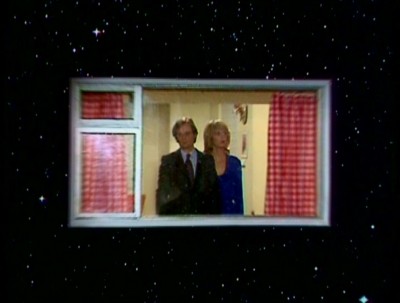
The DVD:
The Video:
Like almost all U.K. television at the time, Sapphire and Steel was shot on videotape for all studio interior shots...which is 99% of the series. Where these original materials were obtained is anybody's guess, but as they're transferred here, the resulting 1.37:1 fullscreen image is dark, dark, dark, with loss of image detail, lots of video smearing, and a contrasty, noisy picture...all of which vintage U.K. television lovers won't take a second's notice of here.
The Audio:
The Dolby Digital English mono audio track is re-recorded here at too low a level; subtitles or closed-captions are unavailable, too.
The Extras:
No extras for Sapphire and Steel: The Complete Series.
Final Thoughts:
A brilliant, little-seen U.K. sci-fi series, a must-have for anyone interested in the genre, the time period (hee hee!), or the perfectly-cast leads. Superior television fare, ingeniously and intelligently scripted and produced. Had there been just one tiny extra ported over from previously released sets, I would have given Sapphire and Steel: The Complete Series our highest rank here: the DVD Talk Collector Series (which it deserves for content alone). However, I'm still highly, highly recommending Sapphire and Steel: The Complete Series.
Paul Mavis is an internationally published movie and television historian, a member of the Online Film Critics Society, and the author of The Espionage Filmography.


|
| Popular Reviews |
| Sponsored Links |
|
|
| Sponsored Links |
|
|
| Release List | Reviews | Shop | Newsletter | Forum | DVD Giveaways | Blu-Ray | Advertise |
|
Copyright 2024 DVDTalk.com All Rights Reserved. Legal Info, Privacy Policy, Terms of Use,
Manage Preferences,
Your Privacy Choices | |||||||













